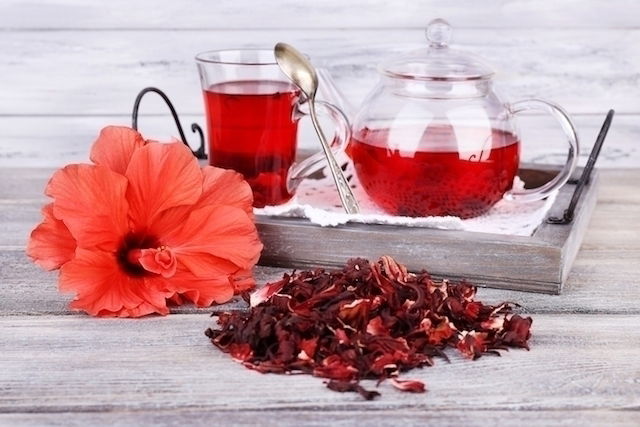Hibiscus (Hibiscus sabdariffa) is a medicinal plant that is rich in flavonoids and polyphenols. These are bioactive compounds with antioxidant action that can fight free radicals and help to prevent diseases like high blood pressure and diabetes.
Hibiscus also contains chlorogenic acid and caffeic acid, which are phenolic compounds that can regulate appetite and promote weight loss.
Hibiscus flowers range in a variety of colors, like red, purple, pink or white, all which vary in antioxidant and flavonoid content. Hibiscus is sold in dehydrated or powdered form, and can be used to prepare juices, teas, salads and jellies. This plant is also found in capsule form for supplementation.

Health benefits
Consuming hibiscus can be good for:
1. Preventing premature aging
Because it is rich in antioxidant compounds, such as anthocyanins, flavonoids and tannins, hibiscus helps fight free radicals, preventing the appearance of sagging, wrinkles and premature aging.
2. Lowering LDL cholesterol
Hibiscus helps reduce total cholesterol and LDL cholesterol levels as it is rich in catechins. These are bioactive compounds that inhibit cholesterol absorption of cholesterol and reduce fat production in the liver.
Hibiscus also fights excess free radicals and prevents the oxidation of fat cells, which can regulate cholesterol and triglyceride levels.
3. Managing high blood pressure
Hibiscus is rich in anthocyanins, which are polyphenols with antioxidant action that promote the relaxation of blood vessels. This promotes optimal blood circulation and help to control high blood pressure.
The anthocyanins present in hibiscus also have a naturally diuretic action which can help to eliminate excess sodium from the body through urine.
4. Promoting weight loss
Because it is rich in polyphenols and phenolic compounds (like anthocyanins, flavonoids, chlorogenic acid and caffeic acid) hibiscus can help to promote weight loss and prevent obesity.
The bioactive compounds in hibiscus help to regulate the levels of hormones like ghrelin and leptin, which are related to appetite. Optimal levels can help to control hunger and reduce overeating.
5. Preventing diabetes
Hibiscus inhibits the action of alpha-amylase and alpha-glucosidase, which are some of the enzymes responsible for carbohydrate digestion. They promoting normal blood glucose levels and can prevent insulin resistance and diabetes.
6. Preventing UTIs
Hibiscus contains antimicrobial properties that can help to combat bacteria like E. coli and Klebsiella pneumoniae, which are microorganisms that commonly cause UTIs.
Hibiscus also has a naturally diuretic action and can increase urine production to promote the elimination of bacteria found along the urinary tract.
7. Promoting liver health
Because it is rich in anthocyanins with antioxidant and anti-inflammatory action, hibiscus maintains liver health, as it can inhibit the accumulation of fat in the liver and protect the cells of this organ against damage caused by free radicals or the use of medications.
8. Reducing the risk of cancer
Hibiscus can reduce the risk of cancer because it is rich in antioxidant and immunomodulatory bioactive compounds. These can strengthen the immune system and inhibit the emergence and multiplication of cancer cells.
However, studies in humans are still needed to support the benefits of hibiscus for preventing cancer.
How to consume
Hibiscus is mainly used in the form of tea, which can be prepared with dried flowers, sachets or powder. Hibiscus flowers can also be used to prepare juices, jellies, sauces and mousses.
Hibiscus is also found in the form of capsule or powder supplements. You can generally take 500 to 1000 mg per day.
How to make hibiscus tea
To make hibiscus tea, you can use the dried flowers, sachets or soluble powder.
Ingredients:
- 1 tablespoon of dried hibiscus flowers
- 400 ml of water
Directions
Boil the water in a pot, remove from heat, and add the hibiscus flowers. Cover the pot and let it infuse for 5 minutes. Then strain and drink. You can drink up to 3 cups of this tea per day.
Possible side effects
Excessive intake of hibiscus tea can cause excess gas, stomach pain, constipation and low blood pressure.
Contraindications
Hibiscus is contraindicated for pregnant or breastfeeding women, as it can cause miscarriage or affect the baby's health. Hibiscus is also not recommended for children under 12 years of age and for people with kidney or liver disease.
People who use medications for high blood pressure, diabetes, non-steroidal anti-inflammatory drugs or chloroquine should only use hibiscus as approved by a doctor, as this plant can influence the effects of these medications.






























